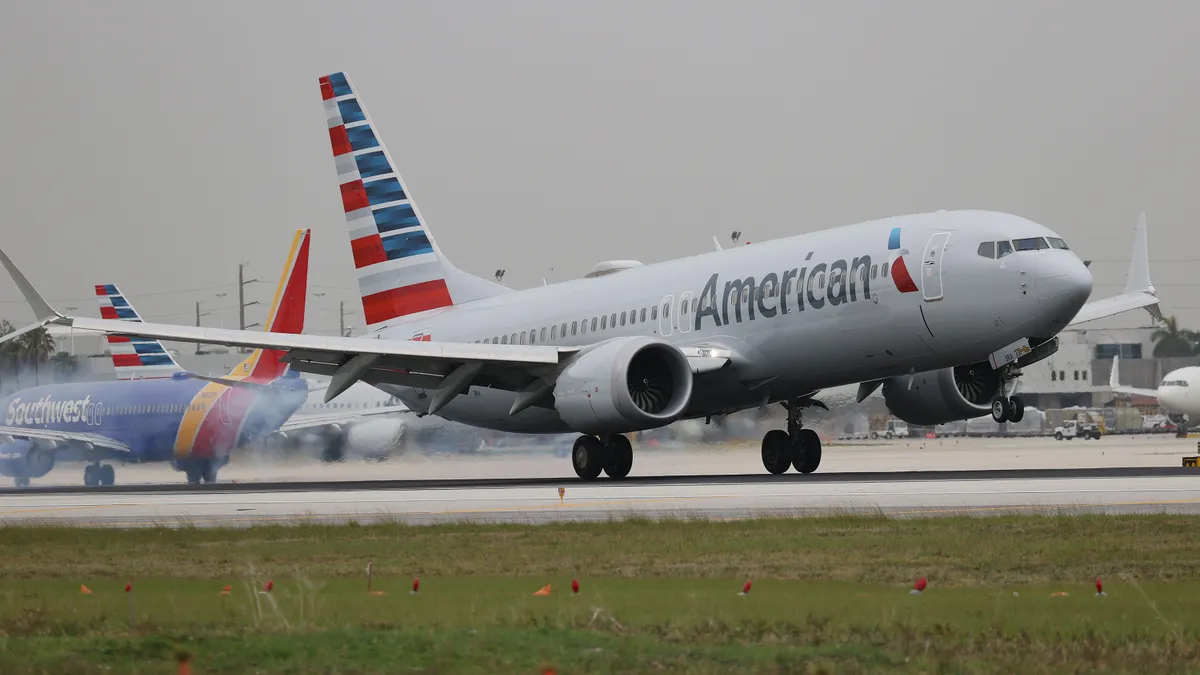Dive Brief:
- American Airlines allegedly retaliated against flight attendants for reporting worker illnesses from jet fuel fumes seeping into the aircraft cabin, the U.S. Department of Labor said in a Jan. 4 press release. The airline faces $6,837 in proposed penalties, according to the release.
- Following a whistleblower investigation, the DOL’s Occupational Safety and Health Administration determined that the Ft. Worth, Texas-based airline retaliated against employees who filed internal complaints about the illnesses, the DOL said. Flight attendants alleged that American docked attendance points and discouraged them from reporting work-related injuries and illnesses, according to the release.
- “Federal law protects workers’ right to voice workplace safety and health concerns without fear of retaliation,” OSHA Area Director Timothy Minor stated in the release. “When employers punish employees for doing so, they create a chilling effect that may stop workers from reporting future issues, putting their health and well-being, and that of co-workers, at risk,” he added. The airline told a Ft. Worth CBS station that safety of team members and customers is always the company’s top priority and that it is reviewing the findings of the OSHA investigation.
Dive Insight:
As part of OSHA’s Whistleblower Protection Program, the agency oversees the whistleblower provisions of more than 20 U.S. laws, including the Consumer Financial Protection Act, the Sarbanes Oxley Act and the Toxic Substances Control Act, as well as federal statures protecting food safety and prohibiting money laundering and antitrust actions, an OSHA fact sheet explains.
This means employers may not retaliate against employees for raising or reporting concerns about hazards prohibited by these laws or any other conduct they prohibit, according to OSHA. In a brochure about recommended practices, the agency explains that employees have the right to provide “tips” or file complaints about a suspected hazard or violation with OSHA or another government agency; report their concerns to the employer; report a workplace injury, illness or hazard; or refuse to conduct tasks that would violate the law.
Also important, OSHA considers a broad scope of employer actions to be retaliatory. For example, workers have the right to call OSHA to report an unsafe condition, so a worker engages in protected activity if, for example, they call OSHA to report what they believe is a fire hazard the employer refuses to fix, the agency explained in a guidance about the Whistleblower Protection Program.
In OSHA’s example, a few days after the employee tells the employer that she’s called OSHA, the employer refuses to let her swap shifts to take time off — an accepted workplace practice. Under these circumstances, it appears the employer denied the shift swap because the employee engaged in protected activity, the guidance explains. If so, then retaliation has occurred and the employer violated federal law, OSHA said.
There are five key elements to prevent retaliation, starting with senior management leading by example and backing their words with actions, according to OSHA recommendations. Also, managers at all levels should be held accountable for the quality of their response to employee concerns, the guidance said. Employers can hold managers accountable by adopting anti-retaliation measures — such as promptly and constructively addressing employee concerns, attending training and championing anti-relation initiatives — in their performance standards and reviews, the agency has suggested.
According to OSHA, an effective anti-retaliation program also includes: listening to and resolving employees’ safety and compliance concerns; having a system for receiving and responding to reports of retaliation; training managers on preventing retaliation; and rigorously overseeing the anti-retaliation program to make sure it’s effective and working as intended.













